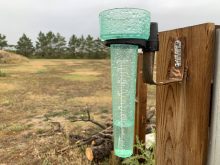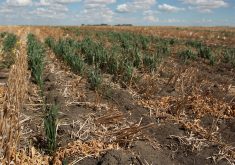JOHANNESBURG, South Africa (Reuters) — Southern Africa faces possible food shortages over the next few months because of a severe drought in South Africa’s corn belt.
The World Food Programme says a lack of rain had caused crop failure rates of more than 50 percent.
The WFP said corn production in South Africa was estimated to have dropped by a third compared with last year, putting it on track for a harvest of 9.665 million tonnes, its worst in eight years.
Besides South Africa, which produces more than 40 percent of the region’s corn, the drought was also likely to hit harvests in southern Angola, Namibia, Botswana, Zimbabwe, Lesotho, Malawi and Madagascar, the United Nations’ agency said in a report.
Read Also

VIDEO: Agritechnica Day 4: Robots and more robots, Nexat loves Canada and the trouble with tariffs
Agritechnica Day 4: Robots and more robots, Nexat loves Canada and the trouble with tariffs.
The problems in land-locked and impoverished Malawi were compounded by heavy rain and flooding in early January, which destroyed crops and roads, it added.
Last month’s outbreak of anti-foreigner riots in South Africa, in which at least seven people were killed and thousands more forced to flee, might also lead to a drop in remittance flows from Africa’s most advanced economy.
This will add to the problems of nearby countries, the WFP said.
“The rains experienced in late March and early April provided some relief to livestock farmers but arrived too late for both staple food and cash crops,” the WFP’s April assessment said.
“Of great concern is Zimbabwe, which is facing a looming huge food deficit due to imminent widespread crop failure.”
Countries in the region were likely to have to supplement their domestic production with increased imports, pushing up the cost of food, the WFP said.














